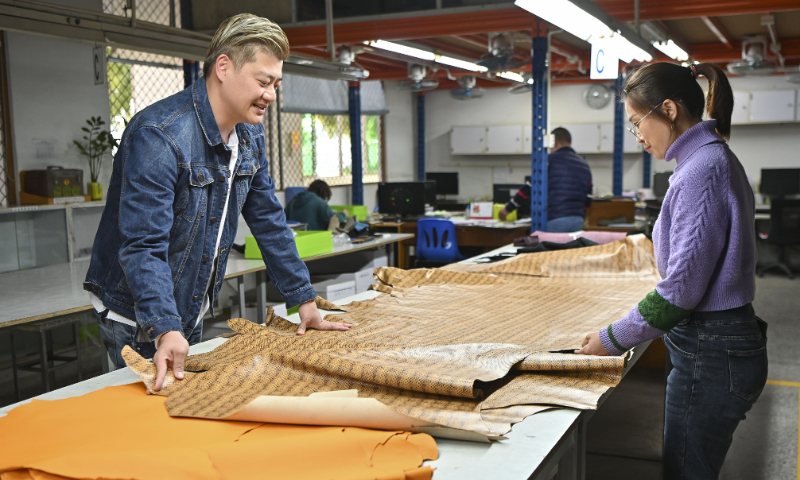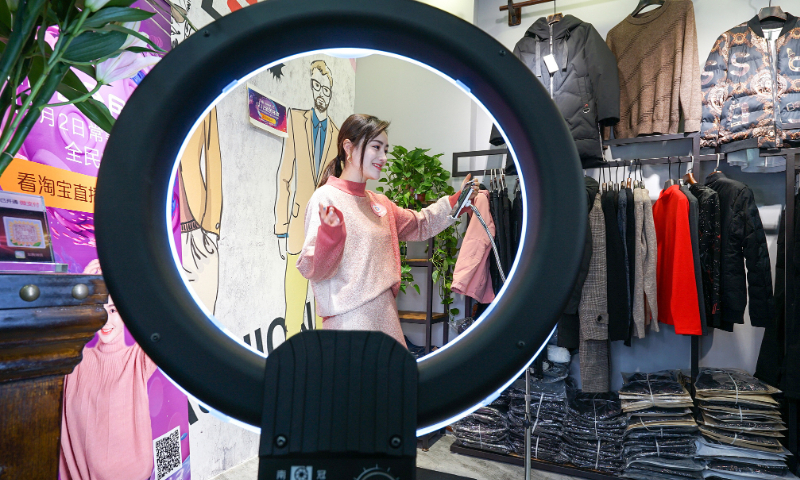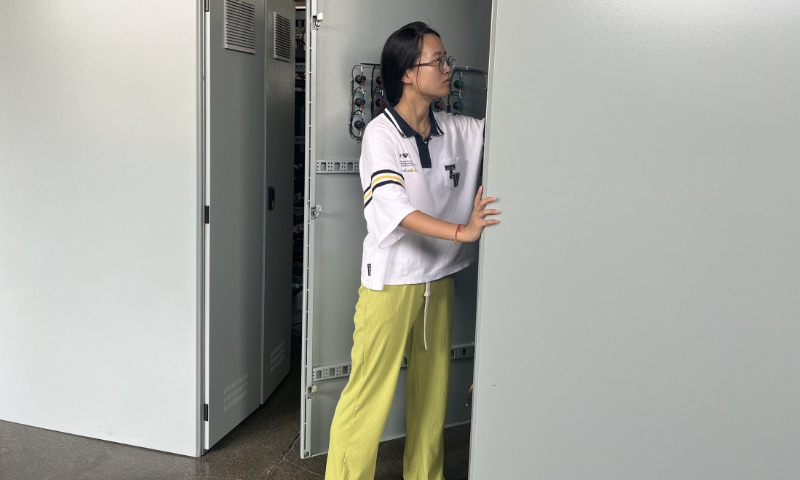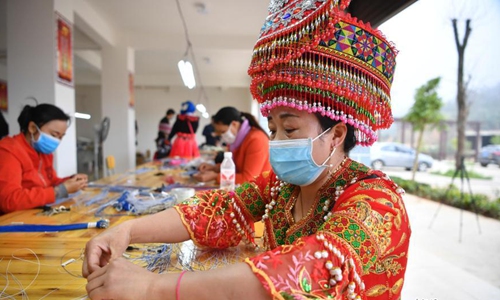IN-DEPTH / IN-DEPTH
Young Chinese take over factories from parents, seeking ways for traditional manufacturing industry in modern times

Wang Boyang (left), a young man from Taiwan inspects a type of leather material with the staff in his factory in Huizhou, Guangdong Province on March 1, 2023. Photo: VCG
Within two months, Xu and her employees made some 230 distribution boxes with a special explosion-proof requirement, a new product they hadn't tried before. To meet the client's demand, Xu spent days and nights in her factory, developing, manufacturing and testing the new product together with workers.
And then Xu smoothly completed the order, just as how she had successfully dealt with her factory's hundreds of orders these years. "I was still pleased and satisfied," she told the Global Times. "It gave me a sense of accomplishment."
Xu owns a small electric equipment set company in Hangzhou, East China's Zhejiang Province. She is incredibly young compared to her current position and the big profit she has gained for her factory.
Take over family business
Xu got the factory from her father. She is one of the growing group of Chinese "chang er dai厂二代," or the second-generation factory owners, which refers to today's Gen-Z Chinese who inherited and took over their family company businesses.
The majority of the companies engage in relatively traditional manufacturing industry, the most popular field their parents' generation devoted themselves to decades ago.
Xu took over her factory in April 2018, before which she had worked at a listed company for months as a general manager assistant. She was neither surprised nor repelled when receiving her parents' call that asked her to return home and manage their own company.
"As the single child of my parents, I'd realized that I would sooner or later take this responsibility," she explained. "Also, to be honest, my previous assistant job was not well-paid compared to owning a factory."
Earlier this year, Chinese lifestyle app Xiaohongshu made a three-minute documentary-like video for Xu, sharing her story with audience. The video soon triggered wide attention on Chinese social media, with many users praising the down-to-earth efforts that young Chinese "factory owners" like Xu make in keeping their traditional factories up to date.
There are increasing number of "chang er dai" who post on platforms like Xiaohongshu, sharing their thoughts and probably confusions about their factory business, a public relations staffer with Xiaohongshu told the Global Times.
"They sincerely discuss [their confusions], and help and support each other for a commonly goal: [preventing] traditional factories from being abandoned by modern times," the staffer added.
Similar to Xu, Lin Sen, now general manager of water meter manufacturer Donghai Group in Ningbo, a city in Zhejiang, joined his family firm after three years of work in Shanghai without much hesitation.
Since his undergraduate studies, Lin has been studying in the US, and has earned degrees of Master of Science in Finance and Master of Business Administration at the graduate level. After returning to China, Lin worked for three years in a well-known investment bank in Shanghai, where he felt that there was a lot of repetitive work, which was of limited help to his own growth.
He received the interview with the Global Times on the high-speed train on his way back to Ningbo from a business meeting in Fuzhou, Fujian Province.
Ningbo is known as the "hometown of water meters." Ning said his company is "one of the best in the field."
"Smart water meters and smart water systems are in increasing demand across the country now, and we are trying to seize this period of opportunity," Lin told the Global Times.

Post-90s livestream host Tong Tong livestreams for her family factory in Changshu, Jiangsu Province on December 2, 2018. Photo: VCG
Enter an alien world
Many "chang er dai" reached by the Global Times admitted that they had very hard days at the beginning of taking over their parents' factories. The manufacturing industry, including its relatively conventional business mode and employment system, is unfamiliar to the young people with little related academic or working background.
Xu joined the factory as its new head in 2018. It was a completely alien world to the then 23-year-old woman majored in design in college. Xu said she spent two and a half years in getting familiar with management work and electric instrument set products.
"The first year was the hardest," recalled Xu. Through the whole year she stayed in her company's front-line production workshop, learning about various products and their manufacturing processes. "Starting from the second year, I have gradually taken over my dad's management work, and started to meet the clients myself," she added.
Xu describes her factory, which has fewer than 30 employees, as a "tiny family workshop." Unlike big enterprises that have clear workflow, explicit division of labor and standard rules, small-sized workshops are more casual to employees' attendance and work performance, Xu told the Global Times, saying this is one of the aspects that she is least accustomed to.
Xu started to make a rewards and punishment system for her employees. Being late or asking for leave, for instance, won't be punished most of the time in the past, "but things are different now."
Xu is the only person who has a university diploma at her factory. Apart from learning from experienced workers, she also teaches them some practical modern techniques, such as Excel and 3-D modeling, trying to bring something new to her relatively old factory.
Lin joined Donghai Group in 2017. "Frankly speaking, it is difficult for me to manage the employees on the shop floor. I know that people are reluctant to step out of their comfort zones, but without destruction, there can be no construction," Lin said.
Lin also faced clashes between different ideas. "I didn't initially specialize in this field, and the company's decision-makers are also my seniors. The intricacies of water meter manufacturing, along with some fundamental technical knowledge about the products, truly require time for me to adapt and learn," he explained.
Lin chose to begin in the marketing department of the group, enabling him to leverage his investment banking strengths, "and also to quickly grasp the entire industry," Lin said.

Xu Lingji works at her electric equipment set company in Hangzhou, East China's Zhejiang Province. Photo: Courtesy of Xu
Retain 'the golden era'
In the latter decades of the 20th century, the diligent and hardworking Chinese who grasped the opportunities brought by China's reform and opening-up together turned China into the world's factory with persistent efforts. That was a golden age for China's manufacturing industry.
But nowadays, for many manufacturers in the country, the increasingly fierce global competition, as well as the growing need for industrial upgrading from supply chains to the end market, has pushed them to explore the possible new ways to retain the "golden era" of Chinese manufacturing industry.
The challenge falls onto the shoulders of the Gen-Z "chang er dai," who are lesser experienced than their forefathers, but better-educated, more open-minded and more sensitive to the development directions of the industries.
Lin said he noticed the upgrading and transformation of the water meter manufacturing industry has come, and he hopes to help his family's enterprises better grasp the future development trend of the industry.
"Our company's previous business was mainly hardware supply. I think we need to upgrade the industry and expand the software of our services. Now we can provide a complete set of 'smart water' solutions," Lin told the Global Times.
At present, Donghai Group has developed a complete set of intelligent metering monitoring and management system based on the Internet of Things, which is exactly the service plan Lin promoted in the group.
It is to install metering equipment such as flow meters on key pipe network nodes of water meters, upload data such as flow, velocity, and pressure in real time, and intuitively understand the water supply and pipe network operation status of the water supply block, Lin explained.
Lin noted that there are currently many young people like him in China who have returned to work for their family companies after studying or having work experience. "In some social organizations, such as the overseas students innovation association and the association of young entrepreneurs, I often come across some friends with similar backgrounds."
Lin believed that more young people who are willing to come back to run or take over their family's factories or industrial corporation will give their employees confidence and make them feel that the industry they adhere to is full of hope in the future.
The addition of young people also brings new ideas and concepts to the development of industrial companies, making it easier to cut into the pain points of a traditional industry from a new angle, Lin said.
"In the past, water meter manufacturing was a labor-intensive industry. At its peak, our group had around 1,600 employees, but now we only have more than 900 people," he told the Global Times. "The older generation of employees has retired, and more talented young people have joined. The group has invested in automating and intelligently transforming factories. As a result, the productivity of the group is increasing, and the enterprise atmosphere is becoming more vibrant."
Xu is also thinking about the modernization and upgrading issues for her factory, trying to enhance the factory's productively. "I want to computerize [the operations] at the production end, so that I can clearly know the daily progress of each part in a whole project," she exampled.
Xu retorted to the saying of "Chinese manufacturing industry is fading" that some Western media recently hypes up. Those media may just focus on a certain place over a certain period of time, and they exaggerate a few individual cases into the whole picture of Chinese manufacturing, she said.
"At least for me, I'm still very busy with my factory's numerous orders, approximately more than 100 per year," Xu told the Global Times.
"Moreover, I'm planning to develop export business," she added. "I'm confident with our products, and I expect to explore the vast overseas market."
Zhang Xiaojuan contributed the story


